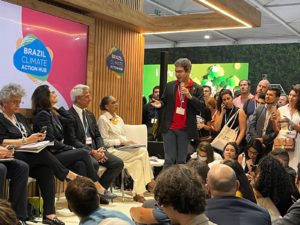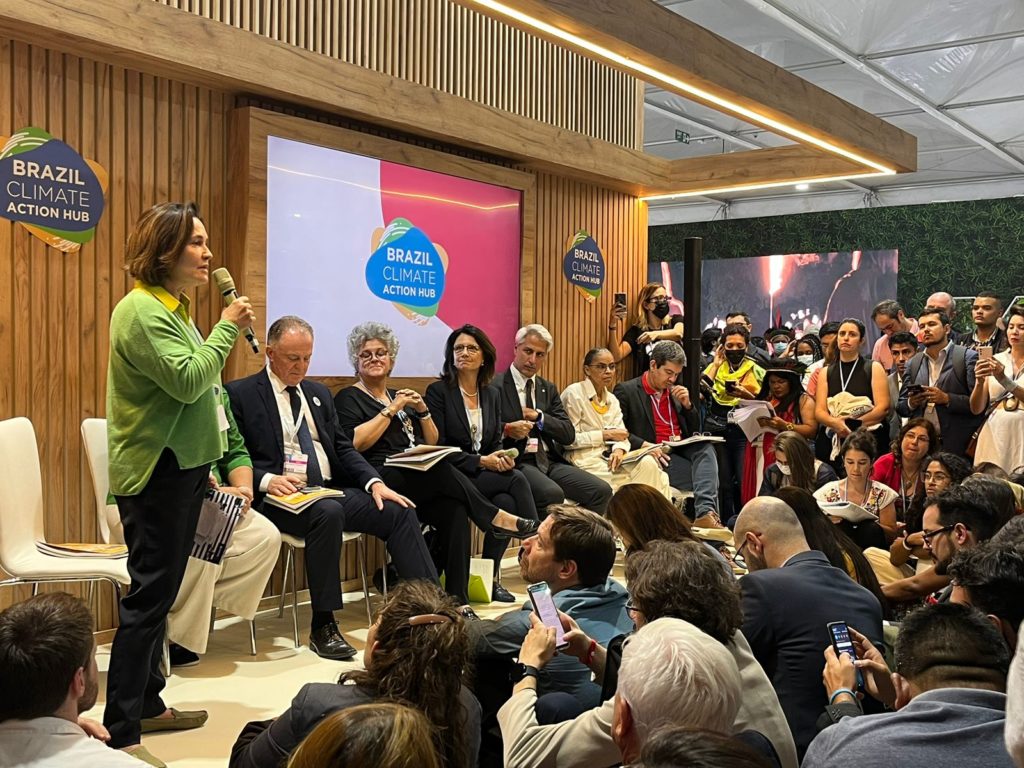Sharm El Sheikh – This Monday (14), Brazilian civil society entities aligned with the private sector presented proposals in the environmental and climate areas for 2023 in a panel at the Brazil Climate Action Hub pavilion at COP27 in Sharm El Sheikh, Egypt. The focus is on a socio-environmental schedule to prioritize sustainable economic development and the reduction of social inequalities.
Specialists listed initiatives for Brazil to resume diplomatic leadership in climate issues. President-elect Luiz Inácio Lula da Silva will participate in COP27 on November 16 and 17, this week’s Wednesday and Thursday.
Representing 105 major companies, the president of the Brazilian Business Council for Sustainable Development (CEBDS), Marina Grossi (pictured above, left), spoke on the progress of the productive sector and what she called the consensus of companies committed to sustainability. Grossi presented a commitment to end illegal deforestation and benefit traditional communities, a document signed by 119 CEOs and 14 entities in the business sector, stating Brazil can preserve and produce at the same time.
“Our environmental asset has to leverage the social asset,” said the representative of CEBDS. In this sense, carbon credits have the potential to make possible concrete actions to impact the daily lives of Brazilians. “Biodiversity and climate are more intertwined in Brazil than in the rest of the world,” said Grossi as she presented the summary of business sector proposals to representatives of the next Brazilian federal government.
On behalf of 400 member companies, from academic representatives to human rights groups, the Ethos Institute suggested guidelines for the socio-environmental agenda to be worked on in a transversal way, with the resumption and revision of plans such as the Agenda 2030 and the UN’s Sustainable Development Goals (SDGs), in addition to stimulating the framework for legalization, income distribution, transparency and inclusion, climate and racial justice, fighting violence and strengthening the leadership of the most vulnerable populations.
Marina Ferro, Executive Manager in Business Practices and Public Policies at the Ethos Institute, recalled, “socio-environmental matters are written together, not separately,” and argued that “companies are essential players, and they need to bring in their compliance tools for consultation and dialogue with communities to strengthen processes, losses and damages, and increase transparency in production chains.”
The president of Igarapé Institute, Illona Szabó, delivered a list of priorities centered on public security, governance, and control of environmental crimes.

For nine years ahead of the Articulation of Indigenous Peoples of Brazil (APIB), Sonia Guajajara demanded the creation of the Ministry of Native Peoples, a promise made by Lula as a candidate for the presidency. “It is important the economic agenda is not dissociated from the environmental agenda,” she said. For the representative-elect, one can no longer think of development as synonymous with deforestation, and it is crucial to have inclusive socio-environmental policies. She also spoke on the resumption of the demarcation of indigenous lands and quilombola territories in the country, the new government’s commitment to zero deforestation, and the participation of indigenous leaders in decision-making.
Representing the Brazil Climate, Forest, and Agriculture Coalition, executive director José Carlos da Fonseca Jr. presented a list of 28 recommendations for Brazil to reduce its emissions, mentioning the priority of access to financing, focus on low-carbon agriculture, resumption of the homologation of indigenous lands, climate funding and the creation of the National Climate Authority.
“We are a country with the ambition and the opportunity to make a collective effort to include socio-environmental issues on the agenda,” added Natalie Unterstell, president of the Talanoa Institute, representing the Climate and Development Initiative.
Other participating civil society representatives included Douglas Belchior, from Black Coalition for Rights; Márcio Astrini, from Climate Observatory; and Renata Piazzon, from Uma Concertação pela Amazônia.
The event had full attendance and was held by the Climate and Society Insitute (iCS) and moderated by executive director Ana Toni. The panel included parliamentarians from different parties, representatives of the indigenous and black movements, and the private sector, who presented suggestions and concrete proposals. “Society is diverse, but all proposals go in the same direction,” evaluated Ana Toni.

Brazil Hub is organized by iCS, Amazon Environmental Research Institute (IPAM), and ClimaInfo Institute, with the support of several civil society entities.
The guests of the government’s transition team were former Minister of the Environment, Izabella Teixeira; deputy-elect and former Minister of the Environment, Marina Silva; senator Randolfe Rodrigues; federal deputy Alessandro Molon; governor of the state of Espírito Santo, Renato Casagrande; federal deputy Joênia Wapichana, the first indigenous woman elected to the Chamber of Deputies; federal deputy Rodrigo Agostinho, and senator Eliziane Gama.
Randolfe Rodrigues
On the panel, Senator Randolfe Rodrigues said the new government will be “the government of indigenous peoples.” In an interview with ANBA at the Brazil Climate Hub, Rodrigues, who is part of the government’s transition team, stated as of 2023, “Brazil will reestablish a multilateral relationship with the world, especially a South-South relationship, strengthening with Latin America, recognition of the historical role of the African continent, and closer ties, especially with the Middle East,” he declared. According to him, the president-elect wants Brazil to host the COP30 in 2025.
Translated by Elúsio Brasileiro




